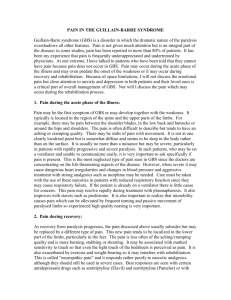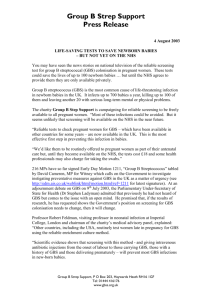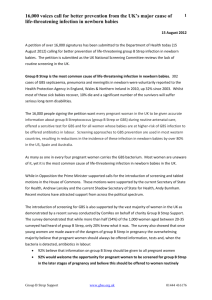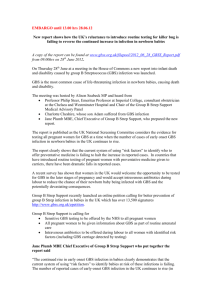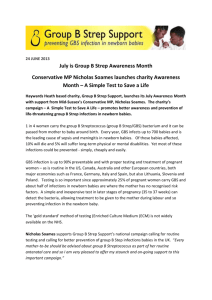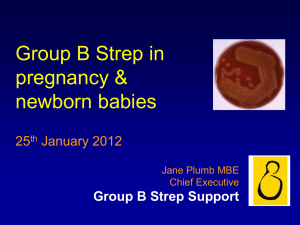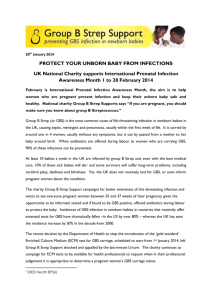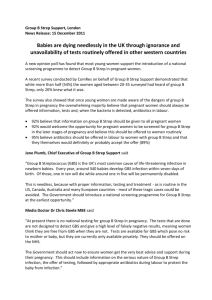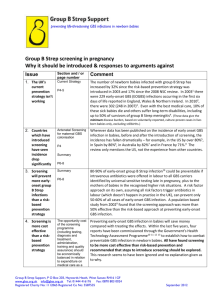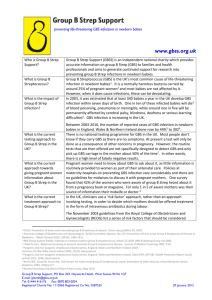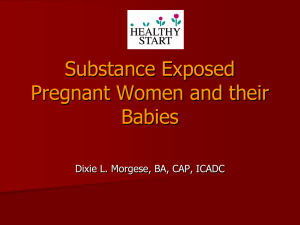Baby charity slams Government screening review for ignoring
advertisement
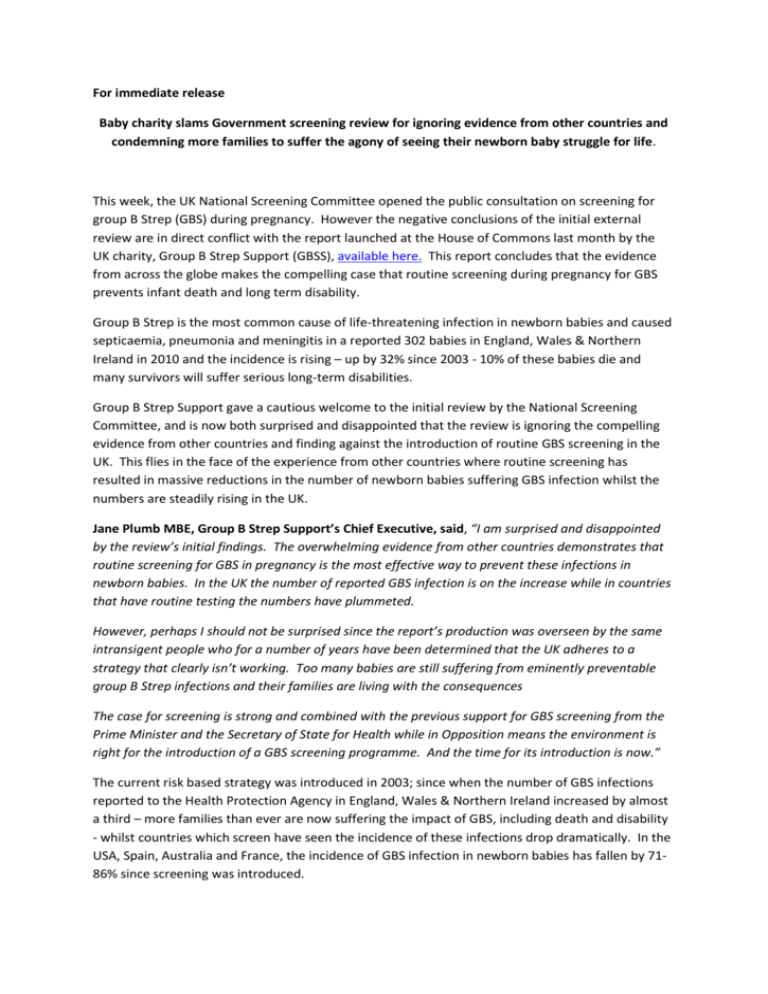
For immediate release Baby charity slams Government screening review for ignoring evidence from other countries and condemning more families to suffer the agony of seeing their newborn baby struggle for life. This week, the UK National Screening Committee opened the public consultation on screening for group B Strep (GBS) during pregnancy. However the negative conclusions of the initial external review are in direct conflict with the report launched at the House of Commons last month by the UK charity, Group B Strep Support (GBSS), available here. This report concludes that the evidence from across the globe makes the compelling case that routine screening during pregnancy for GBS prevents infant death and long term disability. Group B Strep is the most common cause of life-threatening infection in newborn babies and caused septicaemia, pneumonia and meningitis in a reported 302 babies in England, Wales & Northern Ireland in 2010 and the incidence is rising – up by 32% since 2003 - 10% of these babies die and many survivors will suffer serious long-term disabilities. Group B Strep Support gave a cautious welcome to the initial review by the National Screening Committee, and is now both surprised and disappointed that the review is ignoring the compelling evidence from other countries and finding against the introduction of routine GBS screening in the UK. This flies in the face of the experience from other countries where routine screening has resulted in massive reductions in the number of newborn babies suffering GBS infection whilst the numbers are steadily rising in the UK. Jane Plumb MBE, Group B Strep Support’s Chief Executive, said, “I am surprised and disappointed by the review’s initial findings. The overwhelming evidence from other countries demonstrates that routine screening for GBS in pregnancy is the most effective way to prevent these infections in newborn babies. In the UK the number of reported GBS infection is on the increase while in countries that have routine testing the numbers have plummeted. However, perhaps I should not be surprised since the report’s production was overseen by the same intransigent people who for a number of years have been determined that the UK adheres to a strategy that clearly isn’t working. Too many babies are still suffering from eminently preventable group B Strep infections and their families are living with the consequences The case for screening is strong and combined with the previous support for GBS screening from the Prime Minister and the Secretary of State for Health while in Opposition means the environment is right for the introduction of a GBS screening programme. And the time for its introduction is now.” The current risk based strategy was introduced in 2003; since when the number of GBS infections reported to the Health Protection Agency in England, Wales & Northern Ireland increased by almost a third – more families than ever are now suffering the impact of GBS, including death and disability - whilst countries which screen have seen the incidence of these infections drop dramatically. In the USA, Spain, Australia and France, the incidence of GBS infection in newborn babies has fallen by 7186% since screening was introduced. GBSS fears that the National Screening Committee is preparing again to decide against screening, so consigning families across the UK to a risk-based prevention approach that has failed to stem the rising tide of these potentially devastating but usually preventable infections. Craig & Alison Richards’ first child, Owen, died 10 years ago this September from GBS infection. Alison said, “Tragically, despite new guidelines and all the new research evidence, nothing would be done differently today than it was 10 years ago. The only way Owen’s life could have been saved is if I had been tested for GBS late in pregnancy – it’s highly likely GBS would have been found and I would have been offered antibiotics once my labour started. Those antibiotics could have kept my baby safe, but we weren’t offered that chance – in 2002, it simply wasn’t national policy. 10 years on, it’s still not national policy in the UK, although all countries which screen have seen the number of babies sick with GBS infection fall dramatically. The UK figures are rising - I just can’t understand why, despite clear evidence that screening is better than anything else, the UK is choosing to be behind the rest of the western world on this.” Publicly funded research over the last 5 years has repeatedly found that, not only is screening better at preventing GBS infection in newborn babies than the UK’s risk-based strategy, it is also more cost effective and targets the use of antibiotics on those women most likely to be carrying GBS in labour. In contrast, the current strategy regularly means women not carrying GBS are given antibiotics while ignoring many who are carrying the bacterium. A recent survey showed that women in the UK would welcome the opportunity to be tested for GBS in pregnancy and, when GBS is found, offered intravenous antibiotics during labour to minimise the risk of GBS infection in their newborn baby. An online petition launched recently calling for better prevention of group B Strep infection in babies in the UK currently has over 14,000 signatures http://www.gbss.org.uk/epetition. Heartened by the unstinting support from politicians across the UK, GBSS welcomes the opportunity the public consultation gives for families, health professionals and others to make their views known to the National Screening Committee. GBSS will be encouraging everyone to submit their comments by 23 October 2012 when the consultation closes. Contact: Jane Plumb MBE, Chief Executive, Group B Strep Support for comment or to contact families affected by group B Strep. Case studies and photographs are available upon request. Tel: 01444 416176 e-mail: Office email: jplumb@gbss.org.uk info@gbss.org.uk Notes to editors: GBSS is a UK charity set up in 1996 to prevent GBS infection in newborn babies. GBS is a normal bacterium carried by up to 30% of adults. It can be passed from mother to baby around labour. This causes no problems for most babies: for others can be deadly, causing blood infection, pneumonia and meningitis. GBS is the most common cause of life threatening infection in newborn babies. In the England, Wales & Northern Ireland, the reported number of these infections has increased from 229 to 302 between 2003 and 2010 (an increase of 32%) and the rate per 1,000 live births has increased from 0.37 to 0.41 (an increase of 11%) since the introduction of the Royal College of Obstetricians & Gynaecologists’ prevention guidelines in 2003. These increases come at a time when the expectation was there would be a significant fall in GBS infections in newborn babies as a result of the Royal College of Obstetricians & Gynaecologists’ guidelines. Data sourced from annual CDR/Health Protection Reports at www.hpa.org.uk/Topics/InfectiousDiseases/InfectionsAZ/StreptococcalInfections/Epidemiologic alData/ New report on preventable death and disability caused by group B Strep calls for routine screening as incidence continues to rise in newborn babies in the UK was launched by Group B Strep Support at House of Commons event on 28 June 2012. The report can be found at www.gbss.org.uk/filepool/2012_06_28_GBSS_Report.pdf . Newborn babies are at higher risk of developing GBS infection if there are certain ‘risk factors’ present during the pregnancy, labour and delivery. These are: Mum carrying GBS during the current pregnancy, Mum having a GBS urinary tract infection during the current pregnancy, a previous sibling having developed GBS infection, Mum’s waters breaking more than 18 hours before delivery, labour starting or waters breaking before 37 completed weeks of pregnancy and Mum having a fever in labour. ComRes interviewed 1,000 20-35 year old women in the UK online between 28th October and 1st November 2011. Data was weighted to be demographically representative of 20-35 year old women in the UK. The full data tables are available at www.comres.co.uk. A few NHS trusts make sensitive testing for group B Strep available to pregnant women at the request of their health professionals, but most don’t. A number of private medical laboratories do – packs containing the necessary swabs are supplied free, with the postal service for carrying out the test costs around £35. See http://www.gbss.org.uk/test for the availability of sensitive testing following the Health Protection Agency’s BSOP58 from private laboratories. GBSS has no links/ receives no money from any laboratory. Group B Strep Support provides information and support to families and health professionals affected by GBS. It is the UK’s only charity dedicated to the prevention of group B Strep infection in newborn babies and provides comprehensive and reliable information on group B Strep, both printed and online. Group B Strep Support is supported by an independent medical advisory panel http://tinyurl.com/GBSS-MAP. A petition was recently launched calling for better prevention of group B Strep infection in UK babies which has over 14,000 signatures http://epetitions.direct.gov.uk/petitions/4854
